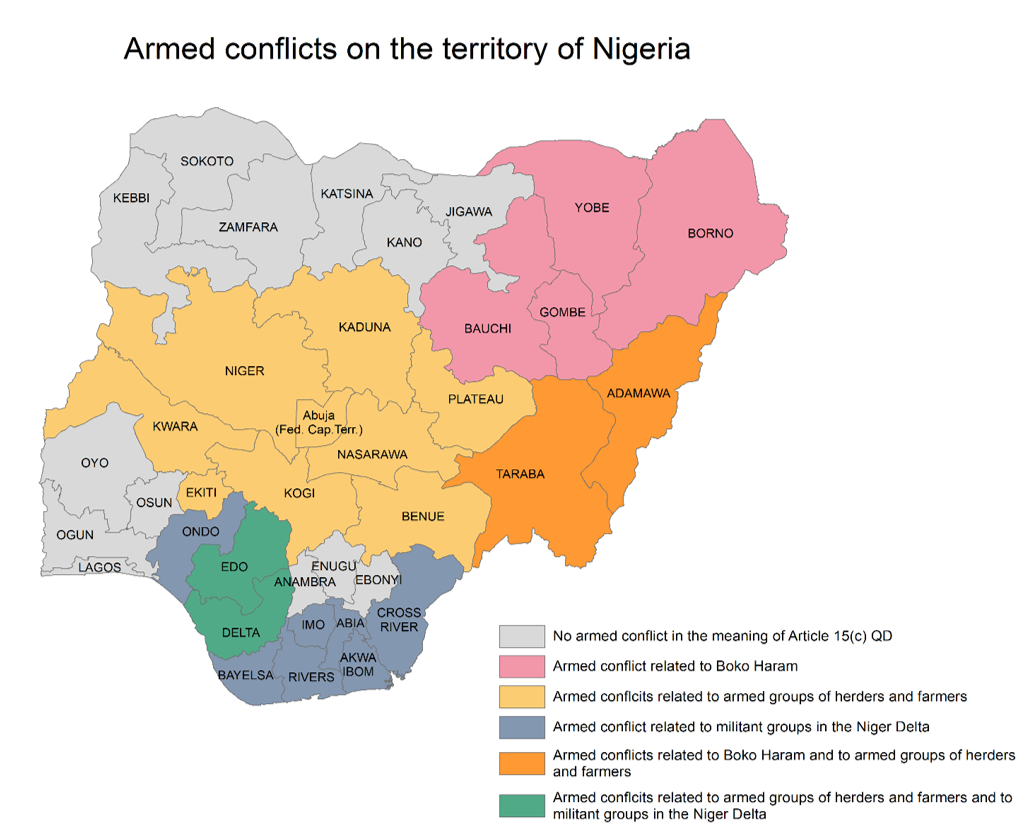A definition of an international or an internal armed conflict within the meaning of Article 15(c) QD is not provided by the Qualification Directive itself. In Diakité, the CJEU interprets the concept of ‘internal armed conflict’ under Article 15(c) QD and concludes that it must be given an interpretation, which is autonomous from international humanitarian law:
…internal armed conflict exists, for the purposes of applying that provision, if a State’s armed forces confront one or more armed groups or if two or more armed groups confront each other. It is not necessary for that conflict to be categorised as ‘armed conflict not of an international character’ under international humanitarian law;[28]
In Diakité, the CJEU sets a low threshold to assess whether an armed conflict is taking place, noting that,
nor is it necessary to carry out, in addition to an appraisal of the level of violence present in the territory concerned, a separate assessment of the intensity of the armed confrontations, the level of organisation of the armed forces involved or the duration of the conflict.[29]
Furthermore, in the context of Article 15(c) QD, differentiation between ‘international’ or ‘internal’ armed conflict is not necessary, as the provision is equally applicable in situations of international and internal armed conflict.
It should also be noted that an armed conflict can be taking place only in parts of the territory.
According to COI, and applying the low threshold introduced in the Diakité, it is concluded that the following distinct armed conflicts in the meaning of Article 15(c) QD take place in Nigeria:

■ Armed conflict between Boko Haram, on the one hand, and the Nigerian Army, the Multi-National Joint Task Force (MNJTF), and the CJTF, on the other: The territorial scope of this conflict includes the states of Borno, Yobe, Adamawa. Its impact also extends to the neighbouring states of Bauchi, Gombe and Taraba. Although the Nigerian government has announced several times since December 2015 that Boko Haram has been ‘technically defeated’ and no longer hold any territory, reports show that some areas across the Lake Chad Basin are still under the control of the different factions of the group. JAS seems to be most active in the North East towards Cameroon, while ISIS-WA operates mostly near the border with Niger.
■ Armed conflicts involving armed groups of farmers and herders, ethnic militias and the Nigerian security forces: The conflicts have affected numerous states across the country, in particular Adamawa, Taraba, Plateau, Nasarawa and Benue, but also Kogi, Kwara, Kaduna, Niger, as well as the Federal Capital Territory of Abuja, etc.
■ Armed conflict between the Joint Task Force (JTF) and the NPF, and the NDA: This conflict takes place in the Niger Delta states, including Abia, Akwa Ibom, Bayelsa, Cross River, Delta, Edo, Imo, Ondo, and Rivers.
It should be noted that some states are affected by several armed conflicts. In particular, Adamawa and Taraba are affected by the conflict with Boko Haram, and the conflicts involving armed groups of herders and farmers. Delta and Edo are affected by the conflicts involving armed groups of herders and farmers and the conflict with the NDA.
With regard to the mounting tension in Kaduna state between the military and the IMN [Security situation, 3.5.1], the latter is not found to reach the threshold of an armed conflict, as the IMN is at present not considered to be an armed group.
Similarly, concerning the violence escalating in the South East with regard to pro-Biafra groups [Security situation, 3.5.2], those groups, and the currently more active IPOB in particular, are not considered armed groups in the meaning of the Diakité judgment.
In Nigeria, other states are also affected by violence, such as violence by criminal gangs or student cults [Security situation, 3.5.3]. The state of Zamfara is a relevant example in this regard because of the widespread presence of bandits and cattle rustlers [Security situation, 3.4]. However, the Diakité criteria are not considered to be met, as this criminal violence does not involve armed confrontations between two or more armed groups.
This is without prejudice to the need to examine the situation in the states where no armed conflict is found to be taking place in the context of refugee status and other subsidiary protection grounds (see the profiles Christian and Muslim minorities in specific areas, Members of separatist movements and individuals perceived as supporting them, Individuals targeted by student cults and the sections on Article 15(a) QD and Article 15(b) QD).
| -------------------------------------------------------------------------------------------------------------------------------------------- |
|
In conclusion, in the context of Article 15(c) QD and applying the low threshold introduced by the Diakité, it is found that several armed conflicts take place in Nigeria, in particular on the territory of the following states: Abia, Adamawa, Akwa Ibom, Bauchi, Bayelsa, Benue, Borno, Cross River, Delta, Edo, Ekiti, Gombe, Imo, Kaduna, Kogi, Kwara, Nasarawa, Niger, Ondo, Plateau, Rivers, Taraba, Yobe, as well as the Federal Capital Territory of Abuja.
With regard to these states, the assessment has to proceed to examine whether the remaining criteria under Article 15(c) QD are also (cumulatively) met.
|
| -------------------------------------------------------------------------------------------------------------------------------------------- |

